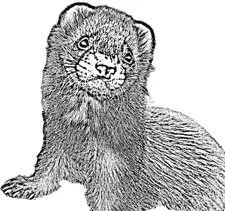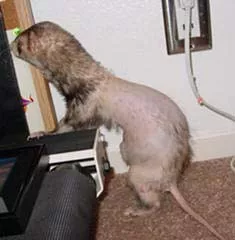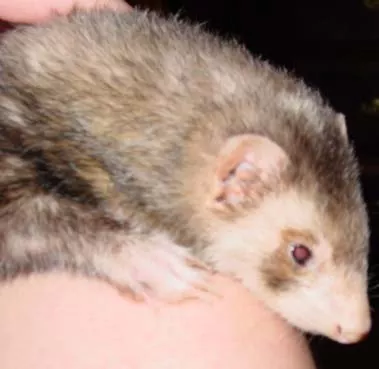
Ferret Adrenal Disease – What a Ferret Owner Should Know About a Bald Ferret
 I spent some time volunteering at a ferret shelter. I’ve owned ferrets for a number of years, and I had some time on my hands since I had just moved to the area. I volunteered to clean cages- as you can imagine with over 100 of the little guys it was quite a job, and had to be done three times a week. Anyway, during the course of changing the cages I got to handle quite a lot of the hobs and jills (male and female ferrets respectively), and it was certainly the high point of the experience. There was one ferret in particular who took a liking to me- her name was Jenny. Jenny was a special little girl in a number of ways, not the least of which was that she was a solitary ferret. Most ferrets prefer the company of other ferrets- a rare few prefer to be alone, or to be with humans. Four-year-old Jenny had been at the shelter for about six months since her previous owner had surrendered her because he found out she was sick- Jenny had Adrenal Disease.
I spent some time volunteering at a ferret shelter. I’ve owned ferrets for a number of years, and I had some time on my hands since I had just moved to the area. I volunteered to clean cages- as you can imagine with over 100 of the little guys it was quite a job, and had to be done three times a week. Anyway, during the course of changing the cages I got to handle quite a lot of the hobs and jills (male and female ferrets respectively), and it was certainly the high point of the experience. There was one ferret in particular who took a liking to me- her name was Jenny. Jenny was a special little girl in a number of ways, not the least of which was that she was a solitary ferret. Most ferrets prefer the company of other ferrets- a rare few prefer to be alone, or to be with humans. Four-year-old Jenny had been at the shelter for about six months since her previous owner had surrendered her because he found out she was sick- Jenny had Adrenal Disease.
Unfortunately this is far too common, many people adopt a ferret without knowing that many of our furry friends will at some point in their lives develop some serious medical conditions. One of these conditions, Adrenal Disease, is estimated to affect over 50% (some say up to 70%) of Americans Ferrets, with the majority of them being female (70% according to Dr. Williams, DVM). Adrenal disease is caused when lesions or tumors form on one or both of the adrenal glands. Typically the disease manifests itself between three and four years of age, but can happen at any time after the first year of life. The symptoms usually begin with hair loss (alopecia) on the tail, and then it works its way forward until there is just a little hair left on the neck, head, and feet. In females, the vulva will usually swell. Sometimes, you will see increased scratching, and a loss of energy. Some ferrets will drink and urinate much more than usual, develop a pot belly, anemia, or show marked weight loss. If you see these symptoms, it’s time for a visit to your vet.
The primary treatment for adrenal disease is removal of the afflicted adrenal gland. For some unknown reason the left gland accounts for the majority (over 60%) of problems. This is good news as the right adrenal is closer to several major blood vessels and is a more involved surgery. When both glands are affected, the veterinarian will usually leave a small portion of the right gland in place to continue to produce hormones and other necessary secretions. If your ferret is very old or sick, the veterinarian may prescribe medication to control (but not cure) Adrenal Disease. There’s an oral medication (Lysodren) which is given every three days for life, or monthly shots of Lupron.
Ferrets who undergo surgery may make a full recovery and live their normal lifespan (six to ten years). Ferrets without surgery or treatment may regrow their hair, but they will not get better. Untreated Adrenal Disease will continue to deteriorate your ferret’s quality of life, and they will become listless and loose muscle tone until they eventually die sooner than their natural lifespan- typically within two years. Part of being a responsible ferret owner is to make sure you get your ferret the medical care it needs.
I ended up adopting Jenny and getting her the needed surgery. Depending upon your vet this typically costs between $300 and $500- it’s a good idea to plan for this expense early with a ferret savings account. Jenny recovered from the surgery beautifully, and was a wonderful pet until she passed on three years later, she more than repaid me in love and laughter.